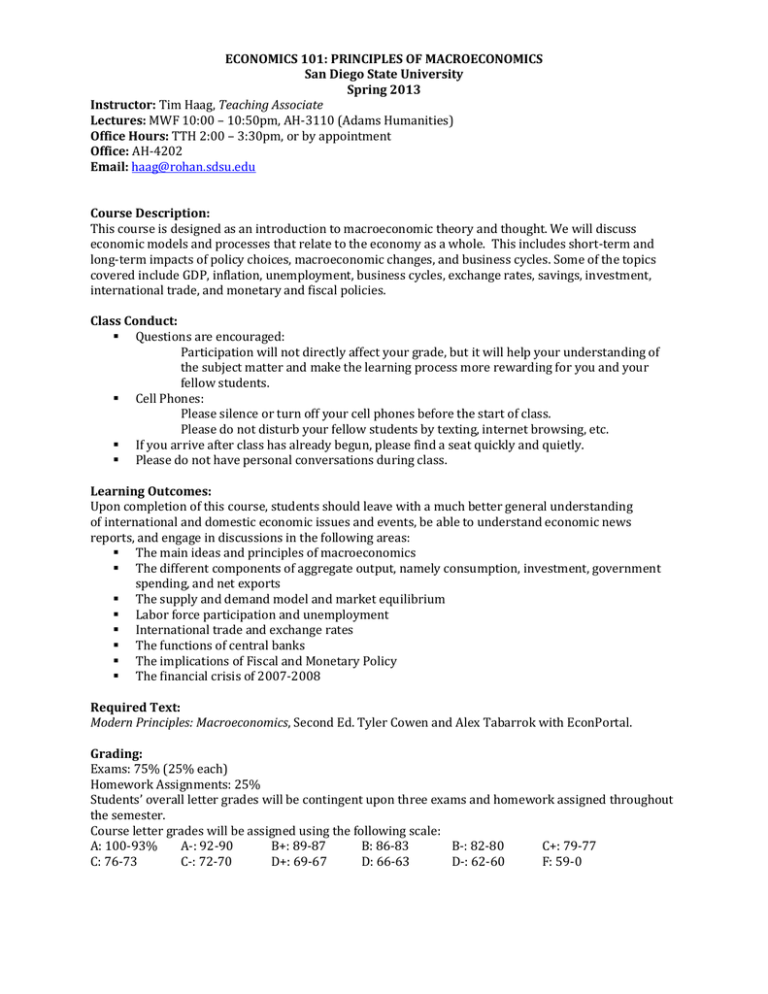ECONOMICS 101: PRINCIPLES OF MACROECONOMICS San Diego State University Spring 2013 Instructor:
advertisement

ECONOMICS 101: PRINCIPLES OF MACROECONOMICS San Diego State University Spring 2013 Instructor: Tim Haag, Teaching Associate Lectures: MWF 10:00 – 10:50pm, AH-3110 (Adams Humanities) Office Hours: TTH 2:00 – 3:30pm, or by appointment Office: AH-4202 Email: haag@rohan.sdsu.edu Course Description: This course is designed as an introduction to macroeconomic theory and thought. We will discuss economic models and processes that relate to the economy as a whole. This includes short-term and long-term impacts of policy choices, macroeconomic changes, and business cycles. Some of the topics covered include GDP, inflation, unemployment, business cycles, exchange rates, savings, investment, international trade, and monetary and fiscal policies. Class Conduct: Questions are encouraged: Participation will not directly affect your grade, but it will help your understanding of the subject matter and make the learning process more rewarding for you and your fellow students. Cell Phones: Please silence or turn off your cell phones before the start of class. Please do not disturb your fellow students by texting, internet browsing, etc. If you arrive after class has already begun, please find a seat quickly and quietly. Please do not have personal conversations during class. Learning Outcomes: Upon completion of this course, students should leave with a much better general understanding of international and domestic economic issues and events, be able to understand economic news reports, and engage in discussions in the following areas: The main ideas and principles of macroeconomics The different components of aggregate output, namely consumption, investment, government spending, and net exports The supply and demand model and market equilibrium Labor force participation and unemployment International trade and exchange rates The functions of central banks The implications of Fiscal and Monetary Policy The financial crisis of 2007-2008 Required Text: Modern Principles: Macroeconomics, Second Ed. Tyler Cowen and Alex Tabarrok with EconPortal. Grading: Exams: 75% (25% each) Homework Assignments: 25% Students’ overall letter grades will be contingent upon three exams and homework assigned throughout the semester. Course letter grades will be assigned using the following scale: A: 100-93% A-: 92-90 B+: 89-87 B: 86-83 B-: 82-80 C+: 79-77 C: 76-73 C-: 72-70 D+: 69-67 D: 66-63 D-: 62-60 F: 59-0 Homework Assignments: Homework assignments and respective due dates will be announced in class and posted on EconPortal throughout the course of the semester. Homework assignments are designed to test students’ knowledge of the material in preparation for the exams. All homework assignments will be completed using EconPortal unless otherwise stated. It is important that students complete the homework assignments by the scheduled due date and time as it will not only account for 25% of their grade, but also help in better preparing students for the application of their knowledge of the material for exams. Failure to submit a homework assignment by the scheduled due date and time will result in a zero for that assignment. Exams: There will be a total of three exams throughout the semester: two midterm exams and a cumulative final exam. All exams are closed book/note, and each student must take the exam at the scheduled date and time. There will be no make-up exams. If a student is unable to sit for an exam, he/she should contact me prior to the exam date. Each exam will cover topics and material presented and discussed in class. Attending class regularly, taking detailed notes, and completing the assignments on EconPortal are highly recommended, as the majority of exam questions will be based on lecture discussions. If you are late to an exam, you may only be allowed to take the exam if no other student has finished and left at the time you arrive to the classroom. If you arrive to the classroom after the first person to finish his/her exam has left the classroom, you will not be allowed to take the exam and your grade for that exam will result in a zero. Academic Integrity: Academic dishonesty and cheating is a serious offense. San Diego State University expects the highest standards of academic honesty from all students. Violations of academic integrity include, but are not limited to, unauthorized assistance on an examination, falsification or fabrication of data, unauthorized collaboration on an academic exercise, plagiarism, misappropriation of research materials, and unauthorized access of an instructor's files or computer account. If your academic integrity is not maintained on an exam or assignment, you will automatically receive an "F" for the class and may face further disciplinary action from the university. Please familiarize yourself with the SDSU Standard for Student Conduct. Attendance: Attendance is not mandatory but it is highly recommended, as exams will be based primarily on what is discussed in lecture. It is important that students take extensive notes during class, and should there be any reason that students miss class it is their responsibility to find out what they missed from a fellow classmate. Students with Disabilities: If you have a disability please contact Student Disability Services at 619-594-6473 (Calpulli Center, Suite 3101). The web site for Student Disability Services is: http://www.sa.sdsu.edu/sds/index.html. Students who need accommodation for their disabilities are welcome to contact me privately to discuss specific accommodations for which they have received authorization or with any other questions or concerns. Email Correspondence: If you email me with questions or concerns regarding course material, assignments, etc., please follow these guidelines and I will respond at my earliest convenience: (1) Please be sure to type ECON 101 in the subject field, otherwise your email may be overlooked. (2) Please refer to the syllabus to see if your questions might already be addressed before writing an email. (3) Please be professional - refrain from using "texting language" and/or excessive abbreviations.


